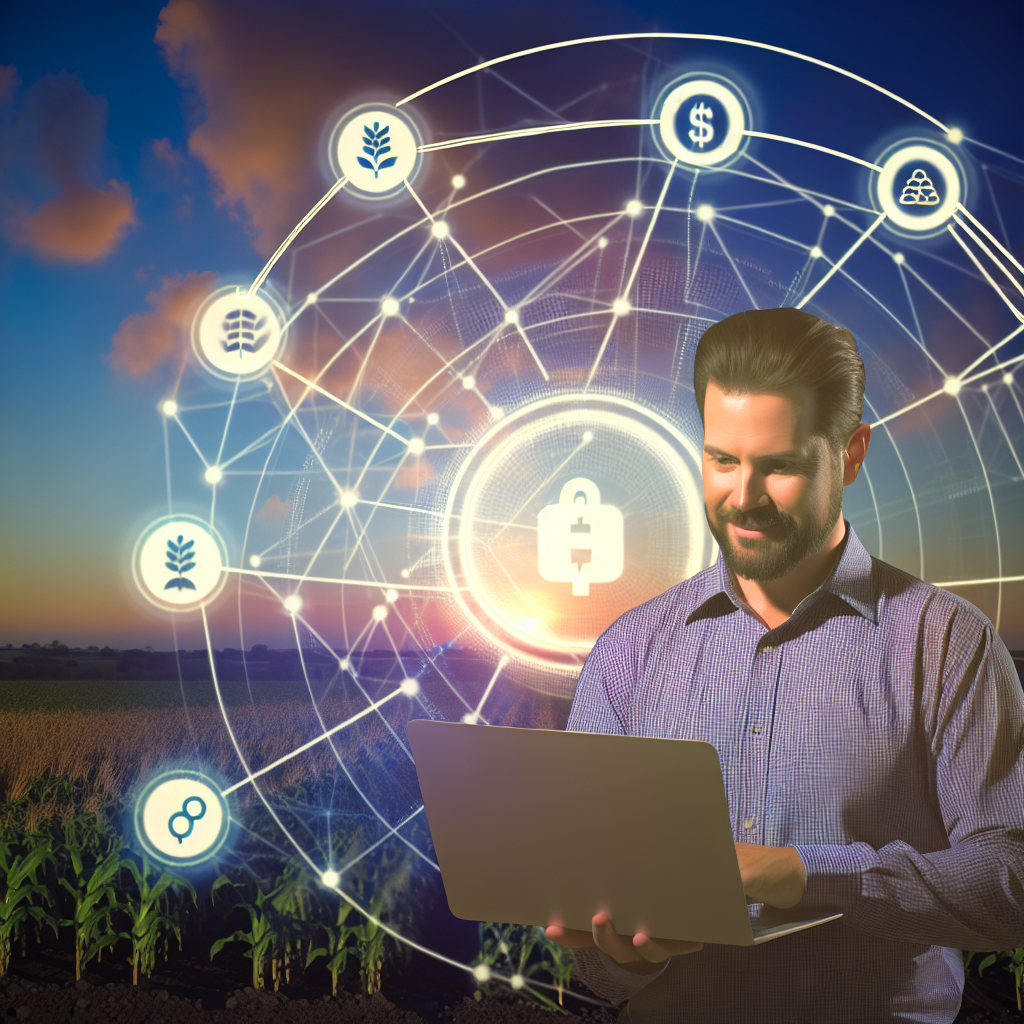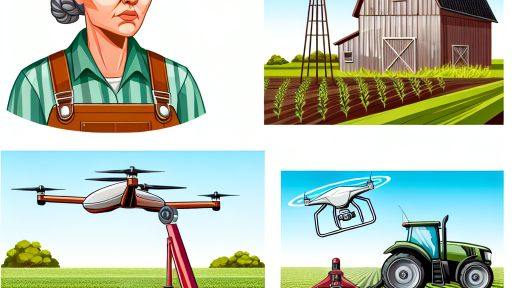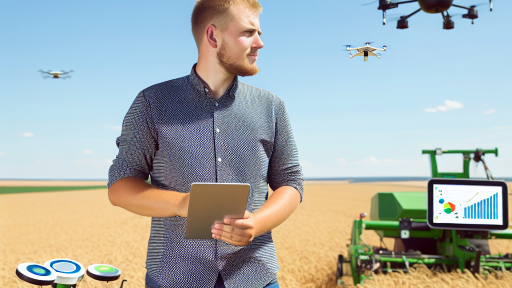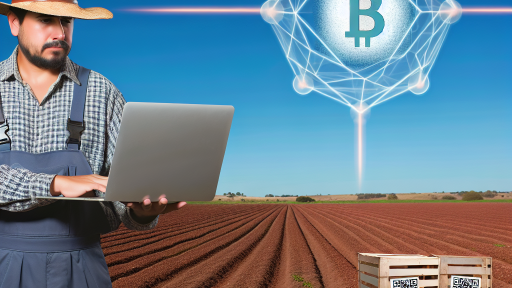Introduction to Blockchain Technology in Agriculture
Blockchain technology is revolutionizing agriculture supply chains.
It enhances transparency and efficiency in operations.
Farmers, suppliers, and consumers benefit significantly from this innovation.
Understanding Blockchain Basics
Blockchain is a decentralized digital ledger system.
It securely records transactions across many computers.
This technology prevents data alteration or fraud.
Key components include blocks, chains, and nodes.
Blockchain’s Role in Farm Operations
Blockchain tracks the entire supply chain process.
It records every transaction from farm to market.
This accountability builds trust among stakeholders.
Benefits of Blockchain in Agriculture
- Improved traceability of produce.
- Reduction in food fraud and contamination.
- Streamlined processes reduce waste and costs.
- Enhanced access to information for all stakeholders.
Challenges to Implementing Blockchain
Despite its advantages, blockchain faces challenges.
Technology integration can be complex and costly.
Additionally, education on blockchain technology is necessary.
Stakeholders must understand its potential fully.
Current Challenges in Farm Operations and Supply Chains
Complex Supply Chain Management
Farm operations face a complex network of supply chains.
Transform Your Agribusiness
Unlock your farm's potential with expert advice tailored to your needs. Get actionable steps that drive real results.
Get StartedDifferent stakeholders often work independently, leading to inefficiencies.
Additionally, tracking the flow of goods is challenging.
Farmers struggle to maintain transparency and traceability.
This complexity often results in higher operational costs.
Inaccurate Data and Reporting
Farm operations rely heavily on data for decision-making.
However, inaccuracies in data collection hinder productivity.
Moreover, outdated reporting methods complicate information sharing.
This inconsistency can lead to poor inventory management.
As a result, farms may experience shortages or overstock situations.
Limited Access to Financial Resources
Accessing financial resources can be difficult for many farmers.
Traditional lending processes often ignore small-scale operations.
This limitation prevents farmers from investing in necessary technologies.
Consequently, farms cannot scale or innovate effectively.
This financial gap leads to stagnation in farm growth.
Environmental Risks and Sustainability Issues
Climate change poses significant risks to farm operations.
Extreme weather conditions disrupt planting and harvesting cycles.
Furthermore, inadequate sustainability practices harm the ecosystem.
Many farms lack resources to implement sustainable practices.
These challenges threaten food security globally.
Changing Consumer Preferences
Consumer preferences continue to evolve rapidly.
More consumers demand transparency regarding food sources.
Farm operations must adapt to these changing demands quickly.
Failure to meet consumer expectations can result in lost market share.
As a result, farms must enhance their supply chain practices.
Showcase Your Farming Business
Publish your professional farming services profile on our blog for a one-time fee of $200 and reach a dedicated audience of farmers and agribusiness owners.
Publish Your ProfileOverview of Blockchain and Its Advantages for Farms
Understanding Blockchain Technology
Blockchain technology records data in a secure and transparent manner.
It functions as a distributed ledger across multiple computers.
This creates an immutable record of transactions.
Blockchain enhances traceability and accountability in supply chains.
Key Advantages for Farms
- Improved transparency in transactions.
- Enhanced traceability of products from farm to table.
- Reduction of fraud and errors.
- Increased efficiency and reduced costs.
Transparency and Traceability
Blockchain provides real-time access to product information.
Farmers can track their produce at every stage of the supply chain.
This leads to greater confidence among consumers.
Furthermore, it encourages better practices among suppliers.
Cost Reduction
Streamlining operations reduces intermediary costs.
Farmers can sell directly to consumers or retailers.
Moreover, this accountability can lead to better pricing strategies.
Enhanced Food Safety
Blockchain technology can quickly trace contaminated products.
This enables immediate action to ensure public health.
Additionally, it simplifies compliance with safety regulations.
Building Trust in the Marketplace
Blockchain fosters trust between farmers and consumers.
Transparent records assure consumers about food quality.
This can lead to brand loyalty and repeat business.
Learn More: How Drones Enhance Crop Monitoring And Management
Case Studies: Successful Implementation of Blockchain in Agriculture
Introduction to Blockchain in Agriculture
Blockchain technology offers transformative potential for agriculture.
This technology enhances transparency and traceability in supply chains.
Many farmers are exploring blockchain to improve efficiency.
Case Study: IBM Food Trust
IBM collaborated with major food retailers to enhance food safety.
The IBM Food Trust platform tracks food from farm to table.
Using this system, Walmart identified contaminated romaine lettuce quickly.
As a result, the supply chain could act swiftly to protect consumers.
Results of Implementation
The implementation reduced food waste significantly.
It also improved consumer trust in food safety practices.
Farmers gained better insights into their supply chains.
Case Study: Provenance
Provenance works with artisanal producers to verify product origins.
This London-based startup helps farmers showcase their goods transparently.
Each product has a digital footprint accessible to consumers.
By using blockchain, consumers can track the entire supply chain.
Impact on Small Farmers
Provenance empowers small farmers to compete in global markets.
Farmers can achieve higher prices for their products.
This approach also builds customer loyalty and trust.
Case Study: VeChain in Asian Agriculture
VeChain’s blockchain solutions target food safety compliance in Asia.
They partnered with local governments to ensure agricultural standards.
The system collects data from farms, warehouses, and retailers.
Stakeholders can access real-time information about food products.
Benefits Realized
This technology enhances accountability throughout the supply chain.
Showcase Your Farming Business
Publish your professional farming services profile on our blog for a one-time fee of $200 and reach a dedicated audience of farmers and agribusiness owners.
Publish Your ProfileIt reduces incidents of food fraud and mislabeling.
Farmers benefited from increased efficiency and lower costs.
Summary of Key Takeaways
Blockchain implementations in agriculture show promising results.
They enhance transparency, efficiency, and consumer trust.
Many organizations are now considering similar technology.
Ultimately, blockchain can reshape the future of agricultural operations.
Gain More Insights: The Key Benefits Of Agri-Fintech Solutions For Small Scale Farmers
The Role of Smart Contracts in Streamlining Farm Transactions
Understanding Smart Contracts
Smart contracts automate transactions on blockchain systems.
They execute predefined terms without intermediaries.
This process reduces the need for manual checks.
Consequently, farmers can save both time and resources.
Enhancing Efficiency in Supply Chains
Smart contracts increase transparency in the supply chain.
Every action taken on the blockchain is recorded.
This transparency builds trust among all parties involved.
Additionally, it minimizes disputes over contracts.
Automating Payment Processes
Farmers benefit from automated payments through smart contracts.
These contracts release payments upon meeting specific conditions.
This feature ensures timely payment for delivered goods.
Thus, farmers can manage cash flow more effectively.
Reducing Transaction Costs
Smart contracts help reduce transaction costs significantly.
By eliminating intermediaries, farmers save on fees.
Lower transaction costs enhance overall profitability.
Facilitating Compliance and Traceability
Smart contracts ensure compliance with industry regulations.
They can automatically verify adherence to standards.
This verification process enhances food safety measures.
Furthermore, traceability improves consumer trust in products.
Case Studies: Real-World Applications
Many farms are adopting smart contracts in their operations.
For instance, GreenHarvest Farms uses smart contracts for vegetable sales.
This approach ensures farmers receive payments upon delivery.
Similarly, DairyConnect utilizes smart contracts for milk transactions.
This system guarantees quality checks before payments.
Challenges and Considerations
Implementing smart contracts comes with challenges.
Technical knowledge is essential for successful integration.
Furthermore, farmers must ensure reliable internet access.
Addressing these challenges can lead to smoother operations.
Learn More: Enhancing Farm Productivity Through Agri-Fintech Innovations

Impact of Blockchain on Traceability and Food Safety
Enhancing Traceability
Blockchain technology significantly enhances traceability across the entire supply chain.
Each transaction is recorded securely and transparently on the blockchain.
This ensures that stakeholders can track food products at any point.
Farmers can monitor their produce, while retailers access crucial data.
Showcase Your Farming Business
Publish your professional farming services profile on our blog for a one-time fee of $200 and reach a dedicated audience of farmers and agribusiness owners.
Publish Your ProfileAs a result, consumers gain confidence in the origins of their food.
Improving Food Safety
Food safety issues arise due to complex supply chains.
Blockchain offers a solution by providing complete transparency.
In case of contamination, rapid tracing becomes possible.
Companies can quickly identify and isolate affected products.
This reduces the impact of food safety breaches significantly.
Building Consumer Trust
Consumers increasingly demand accountability from food producers.
Blockchain meets this demand by offering verifiable information.
Information about farming practices and processes is easily accessible.
This fosters trust and reassurance among consumers.
Ultimately, it can lead to increased sales and customer loyalty.
Facilitating Regulatory Compliance
Compliance with food safety regulations is essential for producers.
Blockchain helps streamline these processes significantly.
It provides an immutable record of compliance-related data.
Regulators can access necessary information with ease.
This reduces the administrative burden on farms and suppliers.
Discover More: How Sensor Technology Enhances Crop Disease Monitoring On Farms
Barriers to Adoption
Cost Implications
Implementing blockchain technology can be expensive for farmers.
Many smaller farms face financial constraints that limit investment.
Moreover, initial setup costs can be significant compared to traditional systems.
Consequently, farmers may hesitate to adopt this new technology.
Long-term savings may not be immediately apparent.
Consequently, some producers may prefer traditional supply chain methods.
Education and Awareness
A lack of knowledge about blockchain remains a significant hurdle.
Farmers often struggle to find resources to understand the technology.
Additionally, local agricultural education programs may not include this topic.
Farmers like Elena Garcia of Riverside Farms express confusion about blockchain.
Many simply do not know how it benefits supply chain management.
Therefore, education must improve to enable informed decisions.
Technology Gaps
Many farms lack the necessary infrastructure to support blockchain integration.
This includes tools such as reliable Internet access and modern devices.
Additionally, farmers may not have staff with the required technical skills.
These gaps hinder the effective implementation of blockchain solutions.
As technology continues to evolve, staying current becomes a challenge.
Thus, organizations must provide targeted support for farmers.
Future Trends: How Blockchain Will Shape the Future of Farming
Enhanced Traceability and Transparency
Blockchain technology significantly improves traceability in agricultural supply chains.
Farmers can track their products from field to consumer effortlessly.
This transparency builds trust with consumers, leading to better market access.
Furthermore, it proves the authenticity of organic and fair-trade claims.
Improved Efficiency and Cost Reduction
By automating transactions, blockchain reduces inefficiencies in supply chain operations.
Showcase Your Farming Business
Publish your professional farming services profile on our blog for a one-time fee of $200 and reach a dedicated audience of farmers and agribusiness owners.
Publish Your ProfileSmart contracts minimize the need for intermediaries, cutting costs substantially.
Farmers can streamline operations, leading to increased profitability.
Overall, this technology enhances operational efficiency across the board.
Strengthened Food Safety
Blockchain enhances food safety by enabling rapid response to contamination outbreaks.
Producers can pinpoint the source of issues more quickly than traditional methods.
This capability reduces the scope and impact of food safety incidents.
As a result, consumers feel more confident in their food choices.
Global Market Integration
Blockchain facilitates smoother transactions in international markets.
Farmers gain access to a wider customer base and diverse market opportunities.
By ensuring secure transactions, blockchain reduces risks associated with cross-border trade.
This integration leads to potentially increased revenues for farmers worldwide.
Sustainability and Environmental Impact
Blockchain can track sustainable farming practices, promoting responsible agriculture.
Consumers are increasingly willing to support environmentally friendly operations.
This technology provides evidence of sustainable practices, encouraging market preferences.
Consequently, farmers are incentivized to adopt greener methods.
The Role of Data Analytics
Blockchain generates vast amounts of data that can be analyzed for insights.
Farmers can optimize yield, predict market trends, and manage resources effectively.
Access to real-time data drives informed decision-making in farming operations.
This integration of data analytics enhances productivity and sustainability.
Additional Resources
How to Apply Blockchain Technology in the Agriculture Supply Chain?
How Blockchain Technology is Transforming the Agricultural …




